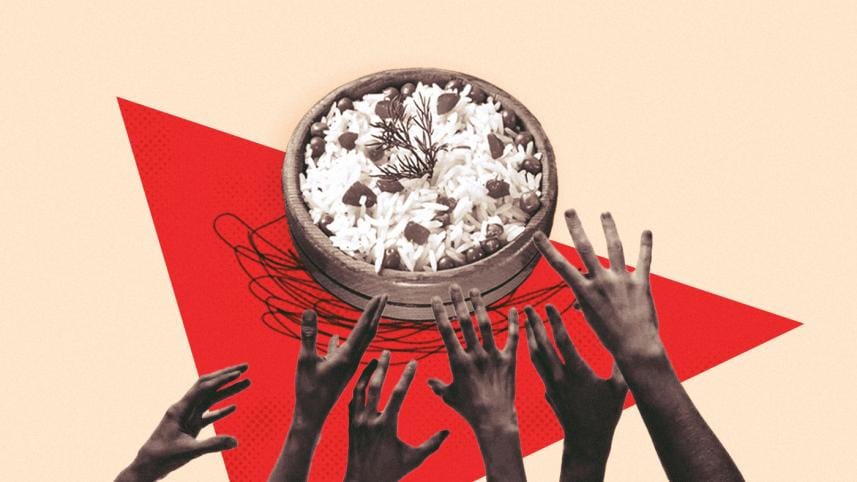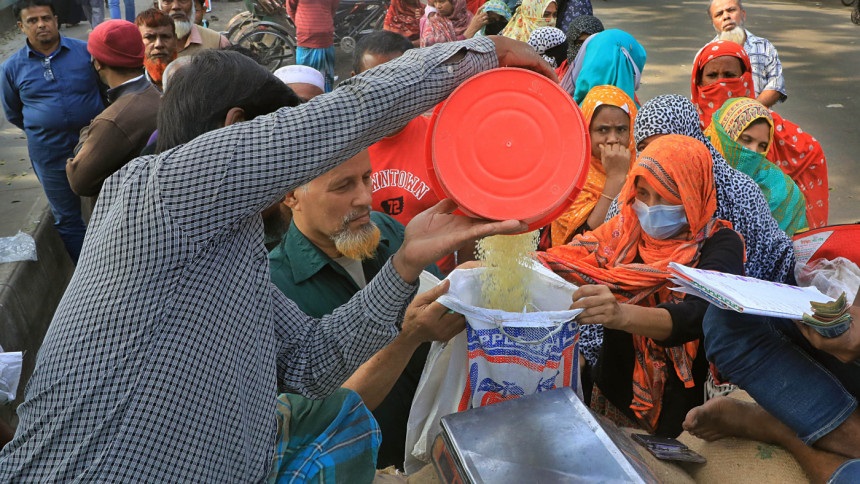How concerned should we be about food insecurity?

The persistent high inflationary pressures in Bangladesh over the last two years have heightened concerns regarding the erosion of food security among a large section of the population. Food security is of paramount importance in the country due to its high number of poor and vulnerable population, coupled with high population density, vulnerability to climate change, and reliance on agriculture.
As a country where a significant portion of the population is engaged in agriculture, with a high concentration of urban poor and vulnerable people who solely rely on the market to access food, stable food availability is crucial not only for ensuring human welfare and social cohesion, but also for enhancing the productivity of our future workforce. Food security is, therefore, intertwined with the economic and social stability and national security of the country.
Beyond the economic turmoil induced by events such as the Covid pandemic and subsequent inflationary pressures, Bangladesh contends with recurrent natural calamities, including floods and cyclones. These events pose a significant threat to the country's food security, as they have the potential to obliterate agricultural yields and disrupt supply chains. Strengthening food security means building resilience against such events, ensuring that food distribution systems are robust and emergency food reserves are in place. It also involves investing in sustainable agricultural practices and technologies, which can increase crop yields and diversify food sources.
In 2018, the South Asian Network on Economic Modeling (SANEM) executed a nationally representative survey covering 10,500 households across Bangladesh. During October and November 2023, SANEM, in partnership with the Global Development Institute (GDI) at the University of Manchester, embarked on another round of surveys with the same sample successfully covering 9,065 households. The latest survey results provided important and alarming insights related to the food security situation in Bangladesh.
The 2023 survey included questions which helped construct a Food Insecurity Experience Scale (FIES) following the 2022 guidelines of the Food and Agriculture Organization of the United Nations (FAO). The FIES consists of eight questions regarding people's access to adequate food. It asks, in the reference period, if the respondents (1) were worried they would not have enough food to eat, (2) were unable to eat healthy and nutritious food, (3) ate only a few kinds of food, (4) had to skip a meal, (5) ate less than they thought they should, (6) ran out of food in their households, (7) were hungry but did not eat, and (8) if they went without eating for a whole day.
Notably, poor households exhibited higher initial levels and eventual surges in these indicators. For example, the percentage of poor households concerned about insufficient food availability escalated from 56 percent in April 2023 to 67 percent in October-November 2023. Similarly, the fraction of such households unable to access nutritious food rose from 69 percent to 75 percent.
Each question contributes to the FIES score. We conducted assessments of the FIES scores at two distinct intervals: in April 2023 and during October-November 2023. Throughout the latter period, escalations were observed across all eight indicators at the national level. Notably, poor households exhibited higher initial levels and eventual surges in these indicators. For example, the percentage of poor households concerned about insufficient food availability escalated from 56 percent in April 2023 to 67 percent in October-November 2023. Similarly, the fraction of such households unable to access nutritious food rose from 69 percent to 75 percent. The diversity of their diet also diminished, with those consuming limited varieties of food increasing from 55 percent to 64 percent. Furthermore, the incidence of meal skipping among these households grew from 14 percent to 19 percent, and two percent reported spending an entire day without food in October-November 2023.
An analogous trend emerged upon juxtaposing the conditions of poor and non-poor households within both rural and urban areas. Intriguingly, urban poor consistently experienced a more acute degree of food insecurity compared to their rural counterparts, a disparity that was extended to non-poor households as well. This suggests that urban residents, irrespective of their economic status, confront greater challenges in securing food. Contributing factors to this urban-rural divide may include the ready availability of agricultural products, prevalent homestead gardening practices, and the relatively lower cost of food in rural locales.
From April to October-November 2023, the FIES indicated a deterioration in food security for both poor and non-poor households throughout Bangladesh. Among the poor, moderate food insecurity climbed by five percentage points and severe food insecurity intensified by three percentage points. Overall, moderate food insecurity rose by three percentage points, and severe food insecurity escalated by one percentage point. By October-November 2023, the prevalence of moderate food insecurity reached 29 percent in rural poor households and 32 percent in urban poor households. Alarmingly, seven percent of poor households in both rural and urban settings were grappling with severe food insecurity.
Over the last couple of years, escalating food prices, in tandem with diminishing real incomes, presented a formidable obstacle in Bangladesh for the economically disadvantaged in securing sufficient and wholesome nourishment. This predicament is particularly dire for people constrained by scant employment prospects or precarious occupations, notably within the informal sector, which lacks safeguards and employee benefits. A majority of poor people find themselves compelled to deplete their savings or incur debt to manage their daily expenditures, yet even these measures are unfeasible for many.
The aforementioned worrying picture of food insecurity in Bangladesh calls for some immediate actions to contain the inflationary pressure and undertaking medium- to long-term strategies. Immediate actions include ensuring a sufficient supply of food in the market through increased domestic supply and necessary imports, undertaking appropriate monetary and fiscal measures to contain inflationary pressure, addressing market distortions, and taking effective actions against anti-competitive practices in food markets. Additionally, social safety nets must be strengthened to protect the most vulnerable populations from food scarcity.
The medium- to long-term strategies include bolstering agricultural productivity through modernisation and sustainable practices, enhancing storage facilities to reduce post-harvest losses, and improving supply chain infrastructure to ensure efficient distribution of food. Ultimately, a multifaceted approach that integrates economic, environmental, and social strategies will be essential for achieving long-term food security in Bangladesh, fostering a resilient society capable of withstanding future challenges.
Dr Selim Raihan is professor of economics at the University of Dhaka and executive director of South Asian Network on Economic Modeling (SANEM). He can be reached at selim.raihan@gmail.com.
Views expressed in this article are the author's own.
Follow The Daily Star Opinion on Facebook for the latest opinions, commentaries and analyses by experts and professionals. To contribute your article or letter to The Daily Star Opinion, see our guidelines for submission.




 For all latest news, follow The Daily Star's Google News channel.
For all latest news, follow The Daily Star's Google News channel. 

Comments